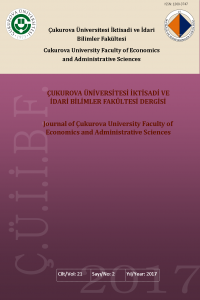Öz
This study investigates effects of the income inequality on democratic regimes levels of the nations. Democratic
regime levels are measured by the Economist Intelligence Unit’s Index of Democracy which is based on five
categories: electoral process and pluralism; civil liberties; the functioning of government; political participation;
and political culture. Based on their scores on a range of indicators within these categories, each country is then
categorized as one of four types of regime: “full democracies”; “flawed democracies”; “hybrid regimes”; and
“authoritarian regimes”. In the study, income inequality levels of the nations are measured by considering their
GINI index values. A cross-country regression analysis was performed in order to see whether any significant
relation exist between the democratic regimes levels of the nations and their income inequality levels.
Anahtar Kelimeler
: Democracy index Economic Inequality GINI index Cross-country regression analysis
Kaynakça
- Acemoglu, D. (2008) “Oligarchic versus democratic societies”, Journal of The European Economic Association, Vol.6-1, p.1-44.
- Acemoglu, D., Robinson, James A.(2008), “Persistence of power, elites, and institutions”, American Economic Review, Vol. 98-1, p.267-293.
- Benhabib, Jess; Przeworski, Adam (2006), “The political economy of redistribution under democracy”, Economic Theory, Vol. 29-2, p.271-290.
- Chong, Alberto; Gradstein, Mark (2007), “Inequality and institutions“, Review Of Economics And Statistics, Vol. 89-3, p.454-465.
- “Economist Intelligence Unit’s Index of Democracy ( 2014)”, http://www.sudestada.com.uy/content/articles/421a313a-d58f-462e-9b24- 2504a37f6b56/democracy-index-2014.pdf
- Gradstein, Mark (2007) “Inequality, democracy and the protection of property rights”, Economic Journal, Vol. 117-516, p. 252-269.
- Huber, Evelyne Stephens and John D. (2014), “Income inequality and redistribution in post-industrial democracies: demographic, economic and political determinants”, Socio-Economic Review, Vol. 12- 2, p. 245-267.
- Huber, Evelyne; Nielsen, Francois; Pribble, Jenny (2006), “Politics and inequality in Latin America and the Caribbean”, American Sociological Review, Vol.71-6, p.943-963.
- Jesuit, David K.; Mahler and Vincent A. (2010), “Comparing Government Redistribution Across Countries: The Problem of Second-Order Effects”, Social Science Quarterly, Vol. 91-5, p.1390-1404.
- Lee, Cheol-Sung; Nielsen, Francois; Alderson, Arthur S. (2007), “Income inequality, global economy and the state”, Social Forces, Vol. 86-1, p. 77-111.
- Mahler, Vincent A. (2010), “Government Inequality Reduction in Comparative Perspective: A Cross-National Study of the Developed World”, POLITY, Vol. 42: 4, p: 511-541.
- Moller, Stephanie, Alderson, Arthur S., Nielsen and Francois (2009),”Changing Patterns of Income Inequality in US Counties, 1970-2000”, American Journal of Sociology, Vol. 114-4, p.1037-1101.
- Przeworski, A.(2005), “Democracy as an equilibrium” ,Public Choice, Vol. 123, 3-4, p.253-273.
- Roemer, John E. (2004), “Will Democracy Engender Equality”?, Economic Theory, Vol.25-1, p.217-234.
- Roemer, John E. (2007), “Will democracy implement long-run equality of opportunity when tax policy is simple?”, Revue Economie Politique, Vol. 117-1, p.119-133.
Öz
Kaynakça
- Acemoglu, D. (2008) “Oligarchic versus democratic societies”, Journal of The European Economic Association, Vol.6-1, p.1-44.
- Acemoglu, D., Robinson, James A.(2008), “Persistence of power, elites, and institutions”, American Economic Review, Vol. 98-1, p.267-293.
- Benhabib, Jess; Przeworski, Adam (2006), “The political economy of redistribution under democracy”, Economic Theory, Vol. 29-2, p.271-290.
- Chong, Alberto; Gradstein, Mark (2007), “Inequality and institutions“, Review Of Economics And Statistics, Vol. 89-3, p.454-465.
- “Economist Intelligence Unit’s Index of Democracy ( 2014)”, http://www.sudestada.com.uy/content/articles/421a313a-d58f-462e-9b24- 2504a37f6b56/democracy-index-2014.pdf
- Gradstein, Mark (2007) “Inequality, democracy and the protection of property rights”, Economic Journal, Vol. 117-516, p. 252-269.
- Huber, Evelyne Stephens and John D. (2014), “Income inequality and redistribution in post-industrial democracies: demographic, economic and political determinants”, Socio-Economic Review, Vol. 12- 2, p. 245-267.
- Huber, Evelyne; Nielsen, Francois; Pribble, Jenny (2006), “Politics and inequality in Latin America and the Caribbean”, American Sociological Review, Vol.71-6, p.943-963.
- Jesuit, David K.; Mahler and Vincent A. (2010), “Comparing Government Redistribution Across Countries: The Problem of Second-Order Effects”, Social Science Quarterly, Vol. 91-5, p.1390-1404.
- Lee, Cheol-Sung; Nielsen, Francois; Alderson, Arthur S. (2007), “Income inequality, global economy and the state”, Social Forces, Vol. 86-1, p. 77-111.
- Mahler, Vincent A. (2010), “Government Inequality Reduction in Comparative Perspective: A Cross-National Study of the Developed World”, POLITY, Vol. 42: 4, p: 511-541.
- Moller, Stephanie, Alderson, Arthur S., Nielsen and Francois (2009),”Changing Patterns of Income Inequality in US Counties, 1970-2000”, American Journal of Sociology, Vol. 114-4, p.1037-1101.
- Przeworski, A.(2005), “Democracy as an equilibrium” ,Public Choice, Vol. 123, 3-4, p.253-273.
- Roemer, John E. (2004), “Will Democracy Engender Equality”?, Economic Theory, Vol.25-1, p.217-234.
- Roemer, John E. (2007), “Will democracy implement long-run equality of opportunity when tax policy is simple?”, Revue Economie Politique, Vol. 117-1, p.119-133.
Ayrıntılar
| Birincil Dil | İngilizce |
|---|---|
| Bölüm | Araştırma Makaleleri |
| Yazarlar | |
| Yayımlanma Tarihi | 29 Aralık 2017 |
| Gönderilme Tarihi | 1 Aralık 2017 |
| Yayımlandığı Sayı | Yıl 2017 Cilt: 21 Sayı: 2 |


